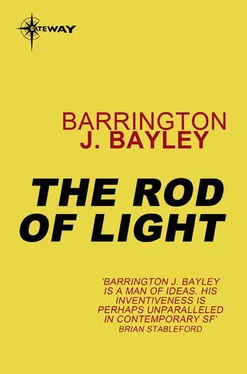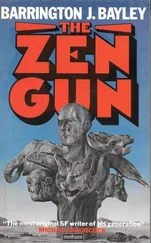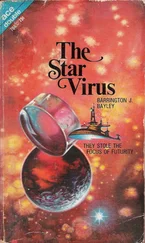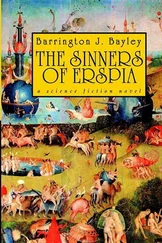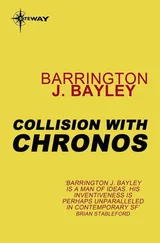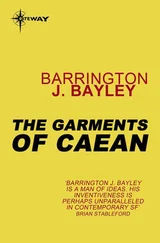‘Have the servitors put him in the store room,’ Gargan said. His eyes fell on Jasperodus. ‘We may reactivate him later, pending your debriefing and a full examination of his mental condition.’
Jasperodus nodded. It made no difference now. Igor had already connected the transmitter to its power source.
‘Did you bring back any useful information from Gordona?’ Gargan enquired.
‘I am afraid not, apart from a few details Igor can provide.’
‘No matter. The end of darkness is near. Since your departure our work has been of the greatest intensity, our progress rapid. I can reveal that we have perfected the arts alluded to in the notebook, solving all requisite problems and duplicating the missing processes. One step alone remains to be accomplished, and as to that, all is ready.’
Gargan’s tone was triumphant. He raised an arm to indicate the honeycomb maze. ‘Before you is one part of the new proceeding. It is a type of capacitor storing what we think of as a new species of energy: informational energy. We call it such because it is information with a signal content so high it develops new properties. The components are delicate, with a high failure rate. As you see, they require frequent replacement.
‘The capacitor acts as a buffer store for the main part of the process, which is housed in a new building. Come, let me show you.’
Leaving the shed, Gargan conducted Jasperodus towards the new erection he had observed when landing. When they were halfway across the dusty ground it suddenly seemed to Jasperodus that its zinc and iron sang, making the air shimmer. He faltered in his step. But the impression vanished just as quickly.
Servitors guarded the entrance. Gargan ignored them, passing directly within. Jasperodus followed, and found the scene confusing at first. The shed was clearly divided into two or more large compartments, for the west wall fell short of its true extent. The east wall was lined with a row of cubicles. Most of the interior, however, was filled with a horizontal array of milky translucent tubes, not unlike fluorescent lighting tubes but running the length of the section. Through the interstices of the array a few robots could be glimpsed, including some of Gargan’s team.
‘You behold success, Jasperodus. Here is the apparatus for extracting consciousness from the human brain.’
He paused for Jasperodus to take in the scene. ‘Our great task can be resolved into three main stages or problems. First, how to extract consciousness from a conscious mind. Second, how to store this consciousness in a neutral retort. Third, how to infuse it into another, robotic brain. In that same order—for they proved progressively difficult—the three phases have been mastered.
‘The root nature of the problem is not properly describable in colloquial language, or even in panlog. I will essay a few remarks, based on analogy. To be brief, consciousness cannot be coextensive with simple physical structures, but only with structures that have a very high degree of integrated complexity. A stone cannot be conscious, but a human brain fulfils the condition; not that it is the only condition, or you and I would automatically be conscious.
‘In the consciousness-ducting process we treat the brain to be exhausted as a negative terminal, and arrange a potential difference with a positive terminal of higher charge. The energy, of course, is the informational energy I have described. On connection there is a resultant current which acts on consciousness like electromotive force. Consciousness then flows to the positive terminal. You now understand the function of the buffer store.’
What surprised Jasperodus was the giantism of everything he saw. Jasper Hobartus could hardly have built anything so huge; all his equipment had been housed in a small cottage. Of course, Hobartus had worked on his process for many years. Perhaps he had been obliged to refine it until it was of manageable proportions. The robots, on the other hand, working at full speed, were not limited in the size of their equipment.
As Gargan finished his last sentence a high-pitched shriek filled the air, accompanied by vivid flaring from the tubes. The suddenness of it was shocking. The shriek seemed to emanate from everything—from the metal of the shed, from the tubes, from the air itself—and in some strange way to consist of light rather than sound. It was as if nature herself were being tortured.
‘The operation frequently produces a superfluity of light,’ Gargan explained when the disturbance was over. ‘Our phrase “the superior light”, it emerges, is something more than mere analogy. There is an affinity between it and physical light, as you shall see.
‘Those cubicles,’ he added didactically, ‘are for the human donors. Gradually the method is being made reliable enough for regular operation; but at present we are able to recover only about one-twentieth part of the consciousness from each human brain we exhaust. The rest is dissipated.
‘This made the need to master the second stage of the proceeding all the more pressing,’ Gargan continued. ‘It is a quirk of this type of work, as I believe the writer of the notebook discovered too, that consciousness cannot be transferred directly from brain to brain. A mediator, in the form of a neutral containing vessel, is required. In our case this retort is also called upon to act as an accumulator, for we decided not to attempt infusion until enough of the superior light for full illumination had been collected.
‘How may such a retort be constructed? A vessel that is not itself a brain, that is neutral, yet that can retain the immaterial substance of consciousness for as long as may be necessary?
‘Come this way, Jasperodus. I am going to show you something that I promise will produce amazement.’
The section of the shed beyond the partition was smaller. A proportion of the milky tubes projected through the upper part of the dividing panel, ending in staggered clusters which made them resemble lateral organ pipes. Otherwise, in stark contrast to the crammed arrangement in the other section, the compartment contained only three objects which were positioned with an almost ceremonial sense of spaciousness.
Bulkiest was the apparatus, quite weird in appearance, that extended from the floor to just under the roof, consisting mainly of a descending series of glass globes, each smaller than its superior neighbour. The topmost of these was fully fifteen feet in diameter: a monstrous, delicate sphere. The smallest, no more than a foot across, was embedded in the roof of a black metal cabinet of a size to accommodate a standing man—or robot. But it was not to this apparatus that Gargan directed Jasperodus’ attention. Instead, he walked to a nearby table spread with a golden cloth. There, resting on a mounting carved from sparkling crystal, was a platinum cylinder about one foot long by three inches thick.
Gargan paused before the table. The scene made an odd impression on Jasperodus, for it was as though Gargan had presented himself before an altar; an impression that was reinforced by the reverential care with which he then picked up the cylinder, turned slowly, and displayed it in both hands.
‘Light: nearly immaterial, immortally mobile, ever-lively, ever-diffractive, infinitely absorptive of data. Remember I told you that physical light has an affinity with the superior light. All these qualities render it uniquely adapted to our aim. This evacuated cylinder which I hold in my hands, Jasperodus, is the container of a container. Within it is a beam of lased light in the red wavelength, preserved by being reflected between two mirrors. It is a beam of light which is conscious of itself . For light is our storage retort.’
‘Conscious…’ Jasperodus echoed in a dazed murmur.
Читать дальше
